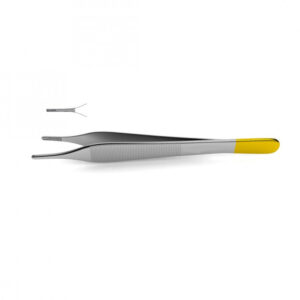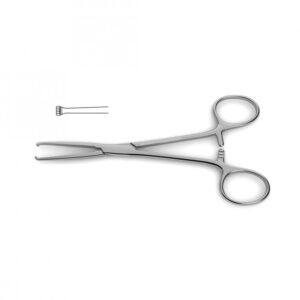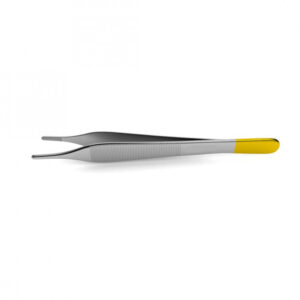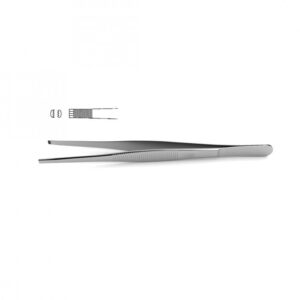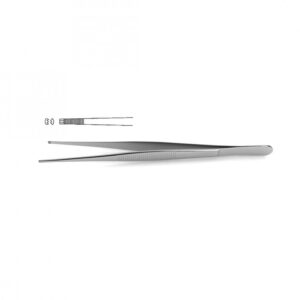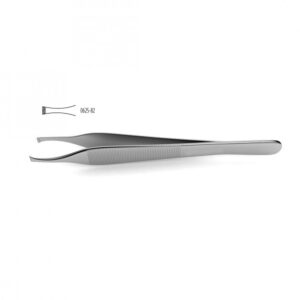| Name | Bainbridge Artery & Intestinal Forceps |
| Lead Time | 0-3 days |
| Specialty | General Instruments-Ring-Handled Forceps – Hemostatic |
| Material Finish | Stainless Steel |
| Grade | Premium Operating Room |
| Units of Measurement | Each |
| Manufacturer | seemab surgical |
| Sterility | Non-Sterile |
| Usage | Reusable |
Bainbridge Artery & Intestinal Forceps
Bainbridge Artery & Intestinal Forceps
standard pattern.
Bainbridge Artery and Intestinal Forceps come in a standard pattern and may be used in medical procedures such as when a bowel needs to be clamped. These forceps have long, slightly tapered jaws with longitudinal serrations that are presented in a curved or straight pattern in different overall lengths.
SKU:
VI-01-149
Category: Forceps & Clamps
Description
Shipping & Delivery
Related products
Allis-Baby Tissue Forceps
Allis-Baby Tissue Forceps
4x5 teeth
Allis-Baby Tissue Forceps contain 4x5 teeth on the tips of the jaws. These jaws are offered in a delicate or extra-delicate style depending on the type of tissue, bowel, or skin that is being held. The 5" or 5 ?" lengths with ring handles are incorporated for added control and maneuverability.
Adson Suture Forceps
Adson Suture Forceps
w/ tying platform, 2.0 mm tips, 4-3/4" (12.1 cm), smooth platform
Adson Suture Forceps with Tying Platform are handcrafted from surgical grade German stainless steel. These forceps are designed with 2.0 mm tips and a tying platform. Available with a smooth platform to securely hold a suture or with 1x2 teeth and a smooth platform for extra grip. This instrument is protected by seemab surgical manufacturer warranty on defects in materials and workmanship.
Allis-Babcock Tissue Forceps
Angled to side, 6-1/4" (16.0 c
Allis-Babcock Tissue Forceps are specifically designed to be used during general surgical procedures in which tissue needs to be grabbed while minimizing any trauma that may be produced to the area. Due to the jaw tips that are fenestrated and angled to the side, this forceps may also be ideal for grasping areas such as the uterus or intestines.
Babcock Tissue Forceps
Babcock Tissue Forceps
standard pattern.
Babcock Tissue Forceps come in a standard pattern with semicircular rounded tips to allow for holding or grasping delicate body structures. These forceps are crafted from premium German operating-room grade stainless steel and are available in a wide variety of lengths.
Adson Thumb Forceps – Tungsten Carbide
Tungsten Carbide
Adson Thumb Forceps are handcrafted from tungsten carbide for a durable and strong instrument. Available in a variety of forms: for dressings with a serrated platform or for tissue with a serrated platform and 1x2 teeth. Each style is also available in a delicate pattern and at several different lengths for a comfortable grip. Tungsten carbide forceps feature tips made from tungsten carbide, the hardest metal made for surgical instruments. Precision-milled serrations are formed onto the tungsten carbide inserts, resulting in pyramid-shaped teeth that provide a non-slip grip. Pyramid-shaped teeth align perfectly with each other to provide a durable and reliable grasp of the most delicate or toughest tissues, as well as needles, sutures, dressing materials and delicate vessels. Smooth tungsten carbide inserts are also available for delicate procedures. Spring tension allows for surgeons to maintain proper and consistent position, ensuring optimal grip without having to apply excess force. These forceps feature gold-plated handles.
Adlerkreutz Tissue Forceps
Adlerkreutz Tissue Forceps
4x5 teeth
Adlerkreutz Tissue Forceps are handcrafted from surgical grade German stainless steel. Designed with 4x5 teeth for a secure grip on tissues. The design allows precise dissection and tissue handling while the teeth assure a secure grasp. Available in a 6" or 8" model.
Adlerkreutz Tissue Forceps – Narrow Jaws
Narrow jaws, 2x3 teeth
Adlerkreutz Tissue Forceps are handcrafted from surgical grade German stainless steel. Designed with narrow jaws and 2x3 teeth for a secure grip on tissues. The slim design allows for delicate and precise dissection and tissue handling while the wider grip assures a comfortable grip for the surgeon.
Adson-Graefe Tissue Forceps
Adson-Graefe Tissue Forceps
4-3/4" (12.0 cm)
Adson-Graefe Tissue Forceps are handcrafted from surgical grade German stainless steel. These forceps are designed with flat, delicate tips for precision tissue handling. This instrument is protected by seemab surgical manufacturer warranty on defects in materials and workmanship. Please note that website images are often representative of the product family and may not conform to the exact specifications or features of the item you select. The final specifications will match the description of the specific catalog item you select.



